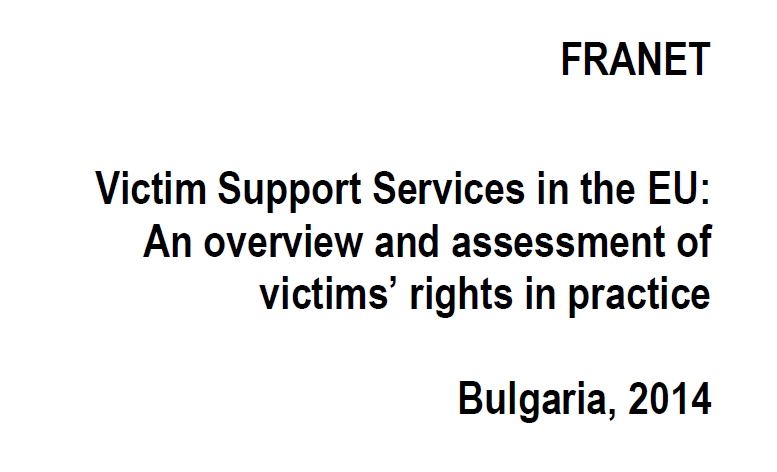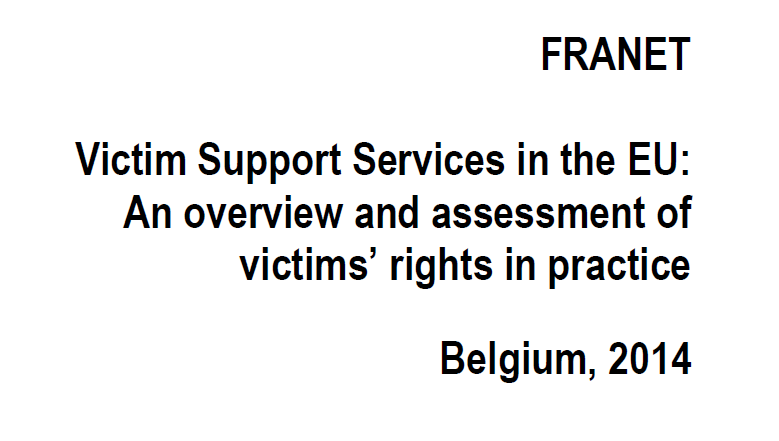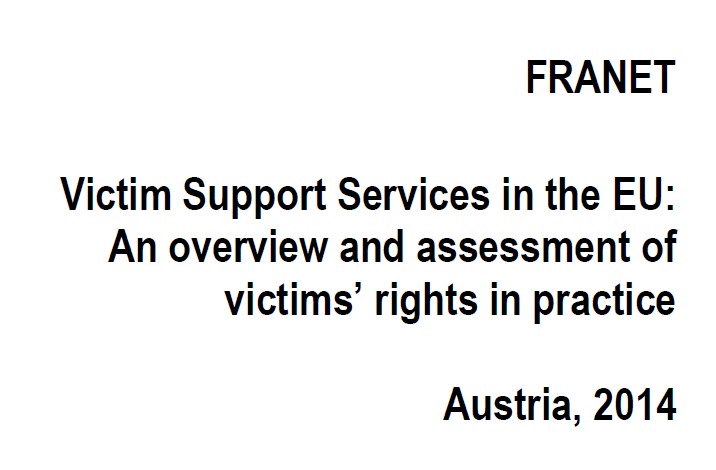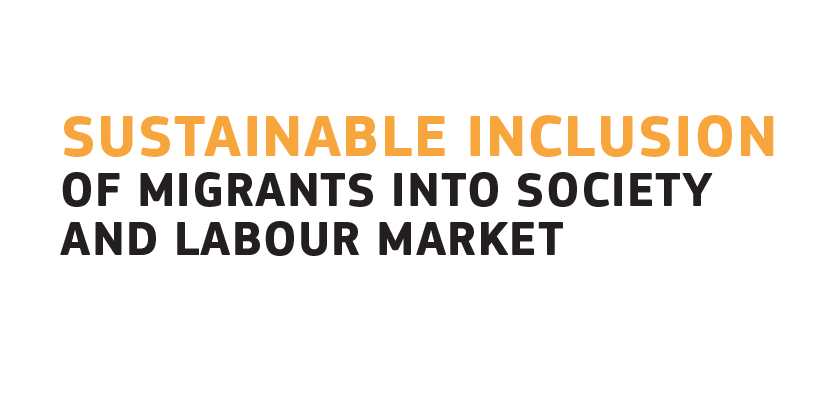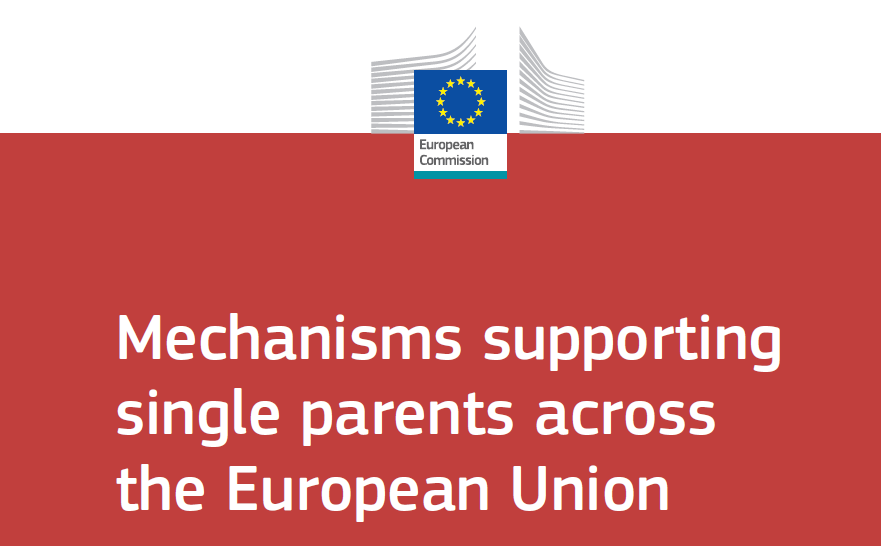For a quick search in the Knowledge database below, please use the search box. Also, note that using one or more of the dropdown filters will optimise your search.
Watch this video to find out more about our Knowledge Database and the publications we have collected here for you: video
Knowledge Database
-
Victim Support Services in the EU: An overview and assessment of victims’ rights in practice – Bulgaria
FRA | Published in 2014
The information presented in this phase is primarily based on analysis of the country specific reports received in phases 1 and 2 of the project; the general overview of the situation of victim support in Member States (phase 1) and the more in depth exploration of the situation, including promising practices which offer support to victims of crime in different ways (phase 2). Information has also been taken from secondary sources such as the 2009 APAV study on Victims in Europe.1 While phase 2 of the project was divided into two parts, focussing firstly on generic victim support services and secondly on specialised areas of victim support, this third phase of the project, comprised of Parts A and B, will focus principally on the structure or lack thereof of generic victim support services; although a limited number of questions relate to specialised areas of victim support.
Keywords: quality standards, referral, support, victim services, victims' rights -
Victim Support Services in the EU: An overview and assessment of victims’ rights in practice – Belgium
FRA | Published in 2014
The information presented in this phase is primarily based on analysis of the country specific reports received in phases 1 and 2 of the project; the general overview of the situation of victim support in Member States (phase 1) and the more in depth exploration of the situation, including promising practices which offer support to victims of crime in different ways (phase 2). Information has also been taken from secondary sources such as the 2009 APAV study on Victims in Europe.1 While phase 2 of the project was divided into two parts, focussing firstly on generic victim support services and secondly on specialised areas of victim support, this third phase of the project, comprised of Parts A and B, will focus principally on the structure or lack thereof of generic victim support services; although a limited number of questions relate to specialised areas of victim support.
Keywords: quality standards, referral, support, victim services, victims' rights -
Victim Support Services in the EU: An overview and assessment of victims’ rights in practice – Austria
FRA | Published in 2014
The information presented in this phase is primarily based on analysis of the country specific reports received in phases 1 and 2 of the project; the general overview of the situation of victim support in Member States (phase 1) and the more in depth exploration of the situation, including promising practices which offer support to victims of crime in different ways (phase 2). Information has also been taken from secondary sources such as the 2009 APAV study on Victims in Europe.1 While phase 2 of the project was divided into two parts, focussing firstly on generic victim support services and secondly on specialised areas of victim support, this third phase of the project, comprised of Parts A and B, will focus principally on the structure or lack thereof of generic victim support services; although a limited number of questions relate to specialised areas of victim support.
Keywords: quality standards, referral, support, victim services, victims' rights -
Trapped: How barriers to escaping an abusive relationship should be addressed by policy and practice
Victim Support (UK) | Published in 2019
This research was designed to explore the barriers experienced by survivors of intimate partner abuse to engagement with services. And to identify differences between those categorised as standard, medium or high risk. This report also makes recommendations for changes in policy and practice to address these barriers.
Keywords: domestic violence, gender based violence, justice, victim services, victims' rights -
European Day of Persons with Disabilities
European Commission | Published in 2019
On 3-4 December 2018, the annual conference celebrating the European Day of Persons with Disabilities (EDPD), organised by the European Commission together with the European Disability Forum (EDF), took place in Brussels, Belgium. This report summarises the main points and challenges that were highlighted during the European Day of Persons with Disabilities conference by the different speakers and participants.
Keywords: discrimination, support, victims' rights -
Diverse approaches to supporting Europe’s most deprived
European Commission | Published in 2019
The Fund for European Aid to the Most Deprived (FEAD) was created with the objective of contributing to alleviating the worst forms of poverty in the EU, such as homelessness, child poverty and food deprivation. FEAD can be used to support the most disadvantaged groups in society by providing food and basic material items such as clothing, footwear and toiletries, or by organising social inclusion activities.
Keywords: discrimination, emergency, poverty, support -
Embedding a children’s rights perspective in policy and decision-making
European Commission | Published in 2019
This policy memo provides an overview of the extent to which children’s rights are promoted and taken into account in policies and practice. The memo considers policy frameworks at national level as well as those at European Union (EU) level. The memo also discusses ways in which policies and wider initiatives facilitate children’s participation in decisions about their future.
Keywords: children, victim services, victimisation, victims' rights -
Social protection expenditure and its financing in Europe
European Commission | Published in 2019
The focus of this report is to analyse the changes in expenditure on social protection systems and their financing across Europe. The report reviews the main sources of financing involved, how they differ between countries and the changes in this over the period 2005 to 2016. It concludes by considering the strengths and weaknesses of the ways in which social protection is financed in different countries, the challenged that may arise, or become more serious, in the coming years, and the potential for meeting these challenges.
Keywords: crisis response, discrimination, poverty, support -
Sustainable Inclusion of Migrants into Society and Labour Market
European Commission | Published in 2019
Labour market inclusion is one of the key areas addressed by EU policies; it is fundamental to becoming part of the host country’s economic and social life. Changing circumstances, such as fluctuations in the size or nature of migrant groups, changes in EU societies and their economies, the long-term nature of the inclusion process, need to be taken into consideration when designing and developing policies in this area. In particular, in order to make labour market inclusion policies “future-proof”, it is important to look ahead and understand the wider-trends shaping the world of work and prepare for future challenges. In light of the ageing of European societies, an effective inclusion of migrants into national labour markets would contribute to the sustainability of national welfare systems. Today there are 3.3 people of working age for every pensioner. If the current trend of a shrinking workforce persists, the ratio will decrease to being two to one in 2070, resulting in an increasing pressure on social security and pension systems. Lastly, inclusion measures require resources which can put pressure on public spending; however, the cost of non-inclusion is even more significant. Effective inclusion policies should be seen as an investment, not a cost.
Keywords: discrimination, migration, support -
Mechanisms supporting single parents across the European Union
European Commission | Published in 2019
This memo presents trends and risks for single parents across the European Union, and provides an overview of existing support mechanisms. We also highlight examples of practices supporting single parents in some Member States. The memo focuses on single-parent households as this type of families is among the most financially vulnerable groups in society. In 2017, single parents with dependent children recorded the highest risk of poverty or social exclusion among all household types.
Keywords: children, family, gender inequality, support
